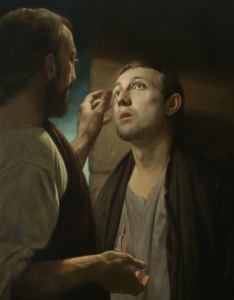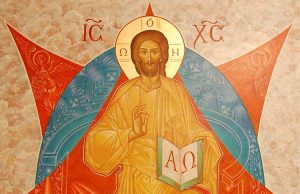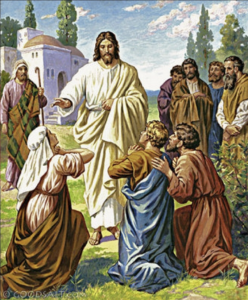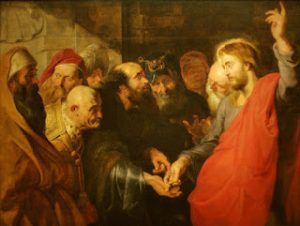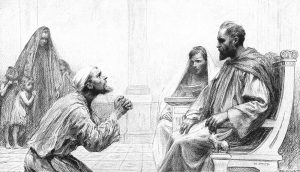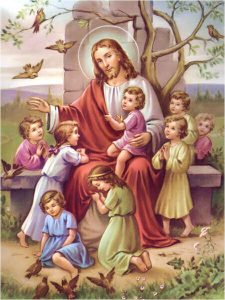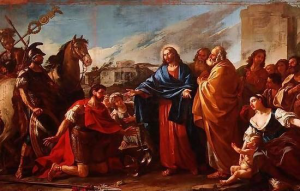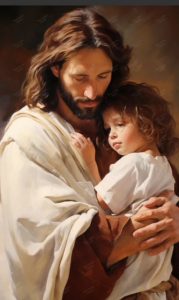Today is the 24th Sunday after Pentecost. This month of November, we remember our beloved dead and pray for their eternal repose. We remember lovingly Annmarie Kuerzi, a lady who drove herself from Mesquite, Nevada just to attend the Extraordinary Form mass, a very devout Catholic. She passed away almost a year ago at the age of 80 plus, and we pray for her soul’s eternal repose. The husband of the late Annmarie, Max Kuerzi, tor whom she prayed a lot, is present today for this mass. May your wife Annmarie rest in peace. Thank you for joining us today.
When we develop faith into relationships with God and others, it is our way to respond to God’s grace and the reality of what God gifted us, the faith with which we are blessed in order to transform our hearts and renew our minds by the goodness of this awesome and loving God. The transformation opens a new vision for us as dearly loved children of God, and when we discover our inherent value and worth. take a pause to have a humble view of ourselves. Then, we begin loving others as God loves us. We become loving towards our brothers and sisters in Christ Jesus, our Lord.
The epistle, from the letter of St. Paul to the Romans, starts with these words, “Brethren, owe no man anything, but to love one another; for he that loveth his neighbor hath fulfilled the law.” (v.8) This phrase has often been a point of reflection on our debt to love. Loving one another is just like a debt we have to pay, a debt that will be endless. We cannot say, “Enough is enough, I cannot love you anymore. I have given to someone the love that God has asked me to love. I have no energy and desire to love her or him anymore at all.” No, we cannot say that. According to St. Paul, loving others is to accept it in the language and imagery of finance and debt. Those who follow Christ must realize that we continue to love both the good and the bad people. Loving good people increases our strength to do good things. Loving bad people helps them in their conversion by our good and loving concern for them. As Christ’s disciples, we continue to love as our payment over and over again, every day of our lives, because we too have been forgiven and are loved by our merciful God.
St. Augustine has this to say, that love is the unique gift of God that is also shown and shared with us. When we lose love and feel tired of loving, the Holy Spirit assists us to drink from its very source of love, God. In doing so, drink from Himself. According to the encyclical written by the late Pope Benedict, “In Deus Caritas Est,” he wrote, “Seeing with the eyes of Christ, I can give to others much more than their outward necessities, I can give them the look of love which they crave.”
When you visit the main altar of St. Rose of Lima Church, please contemplate the love of God as a great river flowing from its tabernacle towards the baptismal font. Nothing can keep this love from pouring through us, except of course, our own blocking of the water because of our refusal to love others. Do you sometimes feel that you have gotten to the end of your love for someone who refuses to love or vice versa? Remember that image, that we are riverbeds through whom God’s endless supply of love and grace flows into this world. So, St. Paul says “Love, therefore, is the fulfilling of the law.”
The gospel today, taken from Matthew 8:23-27, is a passage that is one of the best known and loved in the scripture. Jesus and His Apostles were on the boat. According to the final document of the 2nd session of the 16th Ordinary General Assembly of the Synod on Synodality in Rome, the members of the Synod identify that the Church is “On the Boat, together with Jesus,” dedicated “to the conversion of the relationships that build the Christian community and shape the mission in the intertwining of vocations, charisms and ministries.” In the gospel passage, Jesus together with His Apostles were on the boat on the Sea of Galilee. We heard that Jesus is stronger than the storm. Jesus has the power to calm down those storms if we allow God in our lives, and if we just don’t succumb to fear but have faith in Him. Jesus won’t allow our boat to sink. This is the story of Matthew giving us HOPE during our struggles. However, there are more great points we need to understand as we reflect on the gospel.
First, seeing and believing Jesus is offering greater help at all times. Jesus has been always with us, enough that we can manage our unsettled knowledge about Him. He commands us to believe, to be obedient and to worship Him.
Second, when we entrust everything to the Lord, we are not threatened. We need to rest and relax under His care for He is great, and His concerns are good for our sake.
Third, are you listening to His voice in the midst of your storm, your pain? So can we hear in the silence of our hearts the words of Jesus to console us, to assure us, to heal us so we can enter into His peace? If we don’t listen and ponder on His words in the scriptures, meditate, reflect and pray, how can we achieve the reassuring promise of Christ?
Fourth, Jesus is with us on the boat, and He is with us in His instituted Church. We know how He performs healing and other miracles and heed His preaching. He reminds us of the truth we know; therefore, let us be awake!
Fifth, if you continue freaking out, are you considering Jesus as your company? When we have given up our faith because of the many storms that come through our lives, it is not yet too late to recognize Jesus that He has been with us in the same boat. We must choose Jesus and throw ourselves back into the boat where Jesus is, for in Him there is a promise of comfort and guarantee that He can calm down the winds and the waves.
Sixth, there is a need to pull up on the deck of the same boat, the Church, because it guides us to safety where Jesus is the true captain navigating to safety. When we fail to disembark safely, we pull away from the Holy Catholic Church which Jesus founded. He is God who brings us always to a safe place where there is peace, joy and tranquility of hearts and minds.
Brothers and sisters, today what storms do you need to entrust to Jesus? As we inaugurate the new chapter of our life in the Church, we must increasingly be aware that we are together journeying on Synodality where we become witnesses bringing the light of Jesus to others, through communion, participation and mission of the Holy Church. The kingdom of God belongs to Jesus, our King and the captain of the greater boat, for us to identify ourselves that we are all together in the same Lord and Savior. We have seen it as our purpose together in the love of Jesus towards our neighbors.
God bless you.
Fr. Arlon, osa


